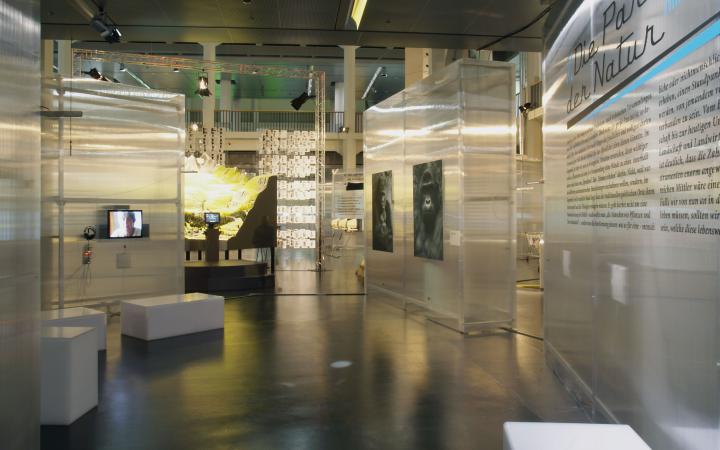Bruno Latour: Making Things Public
Speech on the occasion of the finissage (October 2, 2005)

We, as old European nations, are proud of an immense heritage that embraces Greek thought, as well as Roman law and the religions of books. We measured the planet, built empires and invented the globe. We defined the universe for the rest of the world. But we also triggered the most devastating territorial, colonial and world wars. Conscious of the greatness of our tradition, but also of the errors committed in its name, and of our present weakness, we have solemnly sworn to join our destines - so diverse yet so common - in a political adventure unique in history. Our aim therefore is to rediscover together what will henceforth be our part in the globalisation so warmly advocated.
The formation of a European people still to come:
We, as old European nations, long divided by interests, religions, cultures and languages, swear to contribute in every possible way to the creation of a European people. May they alone be qualified, in what we hope will be a near future, to vote for a true Constitution drafted by a finally legitimate European Convention. It is in expectation of that Constitution, and to establish a European people, that we have resolved to sign this solemn treaty among nations.
Redistribution of the attributes of sovereignty:
We, as old European nations, have extracted all the advantages of the national State, but paid by centuries of fratricidal war the full cost of those advantages. We are conscious of how deeply the peoples of Europe are attached - and rightly so - to the slow formation of their sovereignty. But we are still more conscious of the plasticity of these forms of common life. It is in the certainty of remaining faithful to our particular histories that we have pledged ourselves to a unique undertaking. That undertaking will call back into question and redistribute one by one all the attributes and symbols of sovereignty. We are certain that, despite the change of scale, the sense of security and of belonging, which is so indispensable to civic life, can be regained.
The place of religions:
We, as old European nations, have derived immense spiritual and cultural benefits from Christian religion. But we have learnt, from centuries of inexpiable wars of religion and massacres, the full price of tolerance and secularisation. We accordingly swear to invent and to protect institutions which recognize the importance of established religions. These, however, must be kept at a distance from public action and foreigners, thanks to our welcome extended to them, will be able to reconsider their attachments to their own beliefs. Religions are neither the past nor the future of Europe, but can accompany it in its secular exploration of public space.
The role of economy:
We, as old European nations, invented political economy and then, by means of market organisations, set in motion a previously unknown prosperity. Having suffered, and caused the entire planet to suffer, from the still more dreadful ravages caused by the forms of totalitarianism which they claimed to overcome, we solemnly swear to set up institutions that will re-establish economic organisations solely in democratic forms capable of defining the common good. The time has come for economic science - that secular religion - to be at last separated from the demands of State.
The nature of ecology:
We, as old European nations, have invented, through the stunning development of science and technology, the most fruitful upheavals in people’s conceptions of the world. Conscious of the prodigious heritage received from long lines of European scientists, but also of the destruction which the idea of an exterior nature to be possessed and mastered has caused, we solemnly swear to situate science and technology once again at the hub of our culture. In this way we can learn to cohabit lastingly with forms of life from now on within our political compass. Having long claimed to modernise the planet, we vow from now on to safeguard its ecology.
The limits of Europe:
We, as old European nations, are conscious that no geographical, ethnic, cultural or religious limit can define the future European people. But we are also conscious that only through the sense of a common past can we accomplish our union. We therefore solemnly limit the frontiers of Europe to close neighbour nations that have directly contributed to the history of modernisation and renounced the temptations of empire, and that have for these reasons agreed with us to commit themselves to the invention of a second modernity. Only when its frontiers are defined and definitive will Europe be able to resume, with other political entities, the invention of the global and of the worldwide, whose form it had too quickly believed it could delimit.
Europe and civilisation:
We, as old European nations, are convinced that no other part of the world has accumulated on such a small surface so many geographical and cultural differences and so many miraculous splendours. We are conscious of the obstacles involved, but certain that, without this redistribution of the attributes of sovereignty, we are doomed to perish or to submit to present and future empires. We are confident that Europe will find in it the influence which for centuries it had sought in vain by conquest and hegemony. Having astonished the world by the first civilisation which its history profoundly obscured, it is only through self-assurance that it can resume its historical task of enlightening other peoples and once again offering them - but this time with reason - European construction as an example of what can be achieved by humankind on this planet.